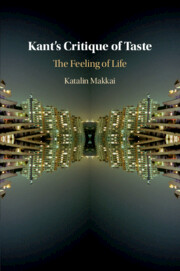Book contents
- Kant’s Critique of Taste
- Kant’s Critique of Taste
- Copyright page
- Contents
- Acknowledgments
- Note on Citations
- Introduction
- Chapter 1 The Art of Judgment
- Chapter 2 Communication and Animation in the Judgment of Taste
- Chapter 3 Subjectivity and Recognition in the Judgment of Taste
- Chapter 4 Modes of Attunement
- Chapter 5 Aesthetic Liking
- Bibliography
- Index
Chapter 5 - Aesthetic Liking
Published online by Cambridge University Press: 07 April 2021
- Kant’s Critique of Taste
- Kant’s Critique of Taste
- Copyright page
- Contents
- Acknowledgments
- Note on Citations
- Introduction
- Chapter 1 The Art of Judgment
- Chapter 2 Communication and Animation in the Judgment of Taste
- Chapter 3 Subjectivity and Recognition in the Judgment of Taste
- Chapter 4 Modes of Attunement
- Chapter 5 Aesthetic Liking
- Bibliography
- Index
Summary
This chapter addresses the legitimation of the judgment of taste, the task of its deduction. Kant claims that judgments of taste may be argued about but not disputed. Is there room for a mode of supporting one’s judgment that is distinct from proof (on the one side) and from persuasion (on the other)? This chapter shows that, on Kant’s view, there is, and that aesthetic arguing occupies it. Aesthetic arguing is undertaken with the aim, or in the hope, of opening the way for the other person’s animation: helping the object bring the other person to life, or helping bring her to life for it. The free play of the cognitive faculties expresses or constitutes a caring for the object. To care for or about something or someone is to commit to ongoing engagement with it and to the furthering of one’s care itself. Caring projects an open-ended commitment and looks to the future. It is in this sense that the free play of the cognitive faculties seeks its own indefinite perpetuation. The principle of judgment entails an imperative to care about the world for its own sake, and the judgment of taste models such care.
Keywords
- Type
- Chapter
- Information
- Kant's Critique of TasteThe Feeling of Life, pp. 168 - 195Publisher: Cambridge University PressPrint publication year: 2021

